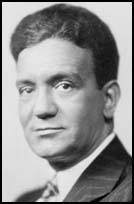Ferdinand Pecora

Ferdinand Pecora, the son of Louis Pecora and Rosa Messina, was born in Nicosia, Sicily, on 6th January, 1882. The family emigrated to the United States in 1886 and settled in Chelsea on the west side of Manhattan.
Pecora became a clerk in a Wall Street law firm and later attended New York Law School and became a member of the New York bar in 1911. Pecora became a member of the Democratic Party in 1916.
In 1918, Pecora was appointed as an assistant district attorney in New York City. Over the next twelve years, Pecora earned a reputation in the city as an honest and talented prosecutor. In 1922, Pecora was named chief assistant district attorney. Seven years later, Joab H. Banton, chose Pecora as his heir apparent, but Tammany Hall refused to nominate him, fearing that he might bring prosecutions against its members. A disillusioned Pecora left the district attorney's office for private practice.
Ferdinand Pecora was appointed Chief Counsel to the U.S. Senate's Committee on Banking and Currency in January 1933, that carried out an investigation into the Wall Street Crash . This included interviewing Richard Whitney (J.P. Morgan), Albert H. Wiggin (Chase National Bank) and Charles Edward Mitchell (National City Bank).
During his inquiries Pecora discovered evidence of irregular practices in the financial markets that benefited the rich at the expense of ordinary investors. For example, from September 1929, Wiggin had begun selling short his personal shares in his bank and at the same time he was committing his bank's money to buying. He shorted over 42,000 shares, earning him over $4 million. His earning were tax-free since he used a Canadian shell company to buy the stocks. Pecora also revealed that J.P. Morgan had a "preferred list" of investors, that included people with political power such as Calvin Coolidge and Owen J. Roberts, who participated in stock offerings at steeply discounted rates.
Senator Burton Wheeler of Montana argued: "The best way to restore confidence in the banks would be to take these crooked presidents out of the banks and treat them the same way as we treated Al Capone when he failed to pay his income-tax." Senator Carter Glass of Virginia claimed: "One banker in my state attempted to marry a white woman and they lynched him."
As William E. Leuchtenburg, the author of Franklin D. Roosevelt and the New Deal (1963) pointed out: "At a time when millions lived close to starvation, and some even had to scavenge for food, bankers like Wiggin and corporation executives like George Washington Hill of American Tobacco drew astronomical salaries and bonuses. Yet many of these men, including Wiggin, manipulated their investments so that they paid no income tax at all. In Chicago, where teachers, unpaid for months, fainted in classrooms for want of food, wealthy citizens of national reputation brazenly refused to pay taxes or submitted falsified statements."
As a result of Pecora's investigations, Congress passed the Federal Securities Act in 1934. Before securities could be offered for sale they had to be accompanied by full and true information. Misleading information or the absence of pertinent information could result in prosecution. The Securities and Exchange Commission (SEC) was set up to supervise the stock market. The commission had five members and enforced the publication of stock prospectuses and the regulation of exchange practices.
Pecora had urged the separation of investment from commercial banking. As a result the Senate also passed the Glass-Steagall Banking Act without a dissenting voice. It also created the Federal Deposit Insurance Corporation, a federal guarantee of bank deposits.
On 2nd July, 1934, President Franklin D. Roosevelt appointed Pecora as one of the five commissioners of the SEC. The following year Pecora resigned from the SEC and became a judge of the New York State Supreme Court. Pecora published a book about the Senate investigations, Wall Street Under Oath: The Story of Our Modern Money Changers in 1939. Pecora was an unsuccessful candidate for Mayor of New York City in 1950.
Ferdinand Pecora died on 7th December, 1971.
Primary Sources
(1) William E. Leuchtenburg, Franklin D. Roosevelt and the New Deal (1963)
Two days after Pecora's inquiry revealed that the twenty Morgan partners had not paid a penny in income taxes in two years, the Senate passed the Glass-Steagall banking bill without a dissenting voice. The Pecora committee had urged the separation of investment from commercial banking, and this feature of the Glass-Steagall bill, highly popular with investors... When Congress adopted the Glass-Steagall Act, it approved not only the separation of investment from commercial banking and certain reforms of the Federal Reserve System but the creation of the Federal Deposit Insurance Corporation. A stepchild of the New Deal, the federal guarantee of bank deposits turned out to be a brilliant achievement. Fewer banks suspended during the rest of the decade than in even the best single year of the twenties.
